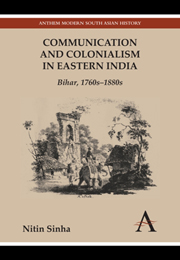Book contents
- Frontmatter
- Contents
- Acknowledgements
- List of Abbreviations
- Glossary
- List of Tables and Illustrations
- Introduction
- Chapter 1 From Affective Forms to Objectification: Spatial Transition from Pre-colonial to Colonial Times
- Chapter 2 India and its Interiors
- Chapter 3 Going into the Interiors
- Chapter 4 Knowing the Ways
- Chapter 5 Controlling the Routes
- Chapter 6 Changing Regime of Communication, 1820s–60s
- Chapter 7 Of Men and Commodities
- Chapter 8 The Wheels of Change
- Conclusion
- Bibliography
- Index
Chapter 2 - India and its Interiors
Published online by Cambridge University Press: 05 February 2013
- Frontmatter
- Contents
- Acknowledgements
- List of Abbreviations
- Glossary
- List of Tables and Illustrations
- Introduction
- Chapter 1 From Affective Forms to Objectification: Spatial Transition from Pre-colonial to Colonial Times
- Chapter 2 India and its Interiors
- Chapter 3 Going into the Interiors
- Chapter 4 Knowing the Ways
- Chapter 5 Controlling the Routes
- Chapter 6 Changing Regime of Communication, 1820s–60s
- Chapter 7 Of Men and Commodities
- Chapter 8 The Wheels of Change
- Conclusion
- Bibliography
- Index
Summary
Perusing Indian colonial records from the 1820s onwards one cannot but note the frequency of the phrase ‘opening up the interiors’. This holds true not only for state records, but also for many other books, tracts and pamphlets written and published around this time. If, in the preceding decades, the spread of Christianity had fuelled the idea of a civilizing mission, from the 1820s it was charged with the power of steam. The oft-repeated phrase ‘opening up the interiors’ and its means – new improved technology of communication, steamships and railways, together with good roads – became an emblem of this civilizational thrust. The general argument ran like this: since India had never enjoyed good means of communication, the country needed to be opened up; the increase in commerce, which would follow the opening up, would at the same time also civilize the indolent natives of the country. From the viewpoint of the state, such an opening up would enable it to control the country better, to speed up the dispersal of troops and information. Hence, communication in general and the opening up in particular was writ large on the colonial agenda of this period.
‘Opening up the interiors’ is a catchphrase that begs a very basic question: what was meant by ‘interior’? Was it a pocket of land or a pattern of untapped commerce through an unknown/uncontrolled area, or a corner of habitation where the jungli and the uncivilized resided?
- Type
- Chapter
- Information
- Communication and Colonialism in Eastern IndiaBihar, 1760s-1880s, pp. 23 - 56Publisher: Anthem PressPrint publication year: 2012



